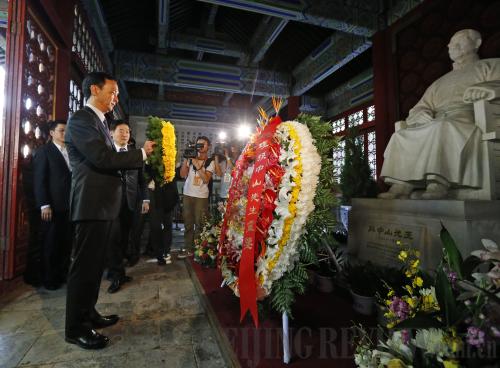
KMT Chairman Eric Chu pays a visit to the Dr. Sun Yat-sen Memorial Hall in Beijing on May 4. Sun is the founding father of the KMT (XINHUA)
A historic meeting
Chu has visited the mainland twice before, though not as KMT chairman. In 1998, he visited Peking University as a visiting professor for the university's centenary. In 2009, as KMT's vice chairman, he attended the First Cross-Straits Forum in Xiamen, southeast China's Fujian Province.
On January 19, the 53-year-old Chu, Mayor of Taiwan's New Taipei City, assumed office as KMT's chairman. His predecessor Ma Ying-jeou had resigned after the KMT's massive defeat in the biggest-ever local elections in November 2014.
Xi, sent a congratulatory message to Chu as the general secretary of the CPC Central Committee in January, expressing his wish to further strengthen communication and deepen mutual trust between the CPC and the KMT.
In his reply to Xi's message, Chu expressed gratitude, saying that the two parties had interacted well and consolidated mutual trust on the basis of the 1992 Consensus during the KMT's past six years in office.
Chu said he expected the two parties will continue to expand their exchanges, strive for mutual benefit and promote ever-lasting peace and prosperity across the Taiwan Straits.
In March, Chu reiterated in a forum in Hong Kong that the KMT's position on the 1992 Consensus was consistent and that the KMT will continue exchanges with the CPC.
Experts believe Chu will follow Ma's policy on developing cross-Straits relations.
Zhu Songling, a Taiwan affairs professor with Beijing Union University, said Chu's words after assuming office demonstrated his recognition of the peaceful development of cross-Straits ties.
From his past statements, it can also be perceived that upholding the 1992 Consensus, opposing "Taiwan independence" and advocating strengthened cross-Straits exchanges and win-win cooperation are Chu's basic viewpoints on mainland-Taiwan issues, said Zhu.
In 2009, when attending the First Cross-Straits Forum in Xiamen, Chu said that people on both sides would never wish to be isolated because of misunderstanding, conflicts or ideological differences and he hoped the two could shelve past disputes and cooperate for development.
The KMT's mainland policies have helped gain support since the party resumed rule over the island in 2008 and the peaceful situation has resulted in obvious benefits for the two, Zhu pointed out.
Cheng You-ping, Director of the Political and Economic Research Center of Taiwan's "National" Taipei University, also believes unchanged policies that contribute to the peaceful development of cross-Straits relations would be the "only choice" for the KMT to turn the table in future elections.
"Chu must let the Taiwan people believe that his party's active role in dealing with issues on cross-Straits relations will bring more benefits to them," Cheng said.
Experts agree the May 4 meeting between Xi and Zhu showcased the two parties' commitments to peaceful development across the Straits.
"The landmark meeting will surely go down in the history of the development of cross-Straits ties. Chu's visit to Beijing means he not only agrees to continue promoting the progress that the two parties have made over the years, but he is also willing to expand cross-Straits exchanges," said Chen Xiancai, a Taiwan studies scholar at Xiamen University.
Chen also said the meeting will have symbolic significance because the KMT is increasingly losing support to the DPP.
"Chu's adherence to the peaceful development may help his party gain more support in the upcoming elections," Zhu said.
Over the last seven years, the KMT has taken advantage of the business opportunities offered by the mainland, in a bid to boost the local economy. "Given the various difficulties that the island has to deal with, Chu should be able to reacquire public support especially from small business owners by promoting things like joining the AIIB and the mainland's new free trade zones," Zhu said.
The mainland has welcomed Taiwan joining in the Beijing-initiated AIIB under a proper name, as well as cooperation with the newly approved free trade zones in the mainland's Guangdong and Fujian provinces, which are geographically close to Taiwan.
At the meeting, Xi also vowed that greater efforts will be made to open up to compatriots from Taiwan. He said the mainland is willing to take the lead in sharing development opportunities with Taiwan.
He called for efforts to create more opportunities for small business owners, farmers, fishermen and young people who want to start their own career. "We will continue to protect the legitimate interests and rights of Taiwan businesses on the mainland and create better environment for their development," he said.
"This formal response relieves worries among Taiwanese compatriots who had thought the era of Taiwan benefiting from the mainland is over," said Ni Yongjie, Vice Director of the Shanghai Institute of Taiwan Studies.
Xi also proposed the two sides improve their people-to-people engagements and strengthen the nation's identity regarding Chinese culture and tradition.
More efforts should be made to ease exchanges between common people, especially for young people to know each other, work with each other and become good friends, he added.
Chu said he hopes the two political parties will deepen cooperation in more areas including safeguarding regional peace, environmental protection and the economy, and provide more opportunities for small and medium-sized enterprises (SMEs) and young people.
"Xi has delivered a message that the Chinese mainland's basic policies toward Taiwan will not change, and the two parties are looking for a better deal to improve the livelihoods of people across the Straits," said Zhang Guanhua, Vice Director of the CASS' Institute of Taiwan Studies.
Xi said he is confident that the Chinese nation will realize its revival in the near future if all Chinese, including people on both sides of the Straits, work together.
"We hope that the CPC and the KMT can share the sacred responsibility to realize the revival of the Chinese nation, improve people's welfare and safeguard peace across the Straits," Xi said.
















































